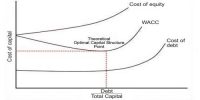Over Capitalization is occurring when a firm cannot service its debt even though its debt/equity ratio is not excessive. It occurs when a company has issued more debt and equity than its assets are worth. It hampers the earning capacity of the enterprise.
The statement “Neither over capital nor under capital is good for an enterprise” is absolutely right because of the following reasons:
Over-capitalization and its bad effects: Over capitalization indicates a situation when an enterprise possesses an excess of assets in relation to its requirement. There are some bad or evil effects of overcapitalization. These are as follows:
- On Owners: Because of a fall on dividends, the shareholders or owners lose heavily.
- On Enterprise: An overcapitalization, the market value of the enterprise’s stock falls and it finds difficult to raise capital.
- On Society: Over capitalized enterprises often come to societal rejection. Society gradually withdraws its acceptance to the products of such enterprises.
Under-capitalization and its bad effects: Undercapitalization is the opposite of overcapitalization. An enterprise is undercapitalized when its actual capitalization is lower than the proper capitalization. There are some bad or evil effects of under-capitalization. These are as follows:
- Aggressive competition: Undercapitalization encourages aggressive competition in the market because it has high profit earning capacity.
- Labor unrest: High profit earning capacity of the enterprise influences workers do demand for high wages.
- Manipulation: Under-capitalization enables management to manipulate the value of shares of the enterprises.
- Higher tax: The Government charges higher taxation. From the above discussion, it is clear that “Neither over capital nor under capital is good for an enterprise”.















